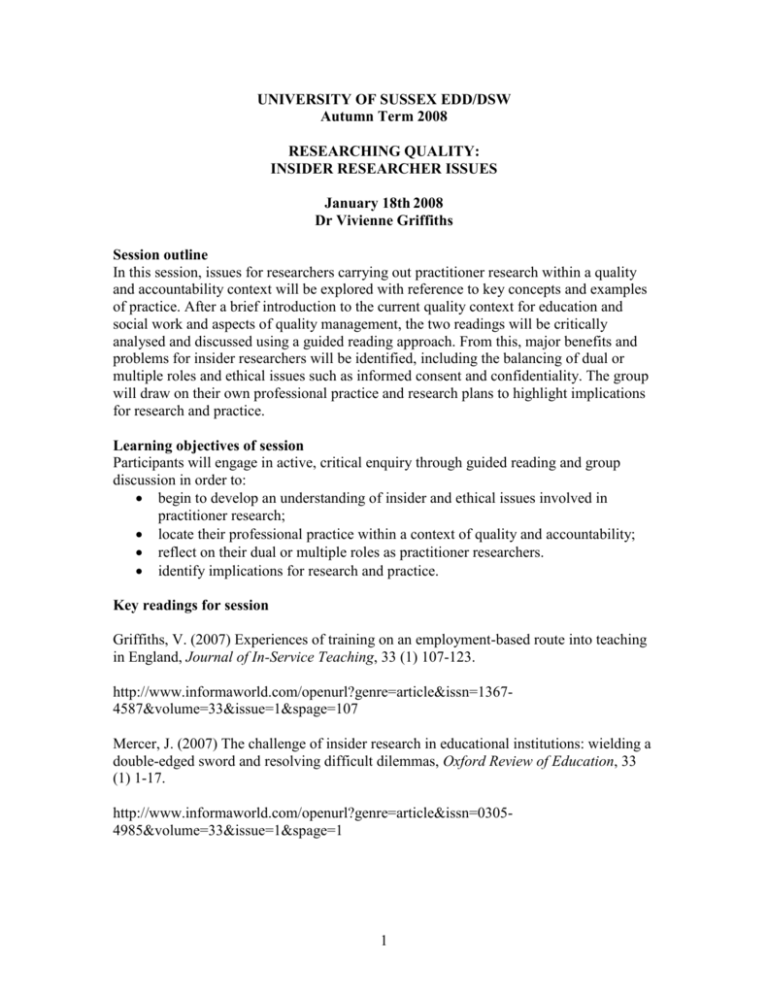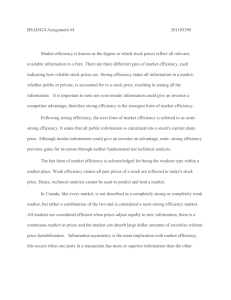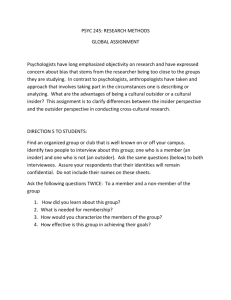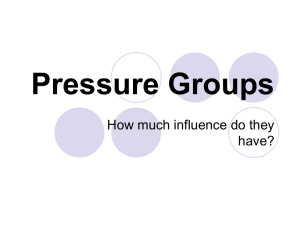Ethics of Insider Research issues
advertisement

UNIVERSITY OF SUSSEX EDD/DSW Autumn Term 2008 RESEARCHING QUALITY: INSIDER RESEARCHER ISSUES January 18th 2008 Dr Vivienne Griffiths Session outline In this session, issues for researchers carrying out practitioner research within a quality and accountability context will be explored with reference to key concepts and examples of practice. After a brief introduction to the current quality context for education and social work and aspects of quality management, the two readings will be critically analysed and discussed using a guided reading approach. From this, major benefits and problems for insider researchers will be identified, including the balancing of dual or multiple roles and ethical issues such as informed consent and confidentiality. The group will draw on their own professional practice and research plans to highlight implications for research and practice. Learning objectives of session Participants will engage in active, critical enquiry through guided reading and group discussion in order to: begin to develop an understanding of insider and ethical issues involved in practitioner research; locate their professional practice within a context of quality and accountability; reflect on their dual or multiple roles as practitioner researchers. identify implications for research and practice. Key readings for session Griffiths, V. (2007) Experiences of training on an employment-based route into teaching in England, Journal of In-Service Teaching, 33 (1) 107-123. http://www.informaworld.com/openurl?genre=article&issn=13674587&volume=33&issue=1&spage=107 Mercer, J. (2007) The challenge of insider research in educational institutions: wielding a double-edged sword and resolving difficult dilemmas, Oxford Review of Education, 33 (1) 1-17. http://www.informaworld.com/openurl?genre=article&issn=03054985&volume=33&issue=1&spage=1 1 Follow up reading Groundwater-Smith, S. & Mochler, M. (2007) Ethics in practitioner research: an issue of quality, Research Papers in Education, special issue, Assessing quality in applied and practice-based research in education: continuing the debate, 22 (2) 199-211. McGinn, Michelle K., & Bosacki, Sandra L. (2004) Research ethics and practitioners: concerns and strategies for novice researchers engaged in graduate education, Forum Qualitative Sozialforschung / Forum: Qualitative Social Research, 5 (2) Art. 6. On-line Journal, available at: http://www.qualitative-research.net/fqs-texte/204/2-04mcginnbosacki-e.htm Other references Becket, N. & Brookes, M. (2005) Analysing quality audits in higher education, Brookes eJournal of Learning and Teaching, 1 (2) 1-12. On-line journal. Available at: http://bejlt.brookes.ac.uk/vol1/volume1issue2/academic/becket_brookes.pdf Brannick, T., Coghlan, D. (2007) In defense of being ‘native’: the case for insider academic research, Organizational Research Methods, 10 (1) 59-74. Bridges, D. (2007) Insider and Outsider Research, Resources for Research in Education, Teaching and Learning Resource Programme http://www.tlrp.org/capacity/rm/wt/bridges/bridges7.html Brundrett, M. & Rhodes, C. (2008) School Leadership for Quality and Accountability, London: Routledge. Burke, P.J. & Kirton, A. (2006) Editorial, Reflecting Education, special issue on insider practitioner research, 2 (1) 1-4. Clifford, D. & Royce M. (2008) Equality, diversity, ethics and management in social work education, Social Work Education, 27 (1) 3-18. Coghlan, D. (2001) Insider action research projects: implications for practising managers, Management Learning, 32 (1) 49-50. http://www.ncsl.org.uk/media/F7B/94/randd-engaged-coghlan.pdf Coghlan, D., Shani, A.B. (Rami) (2008), Insider action research: the dynamics of developing new capabilities, in Reason, P.& Bradbury, H. (eds), Handbook of Action Research, 2nd ed., Sage: London. Elliott, J. (2007) Assessing the quality of action research, Research Papers in Education, special issue, 22 (2) 29 - 246. Furlong, J. & Oancea, A. (2005) Assessing Quality in Applied and Practice-Based Educational Research, Oxford: OUDES. http://www.education.bham.ac.uk/research/seminars1/esrc_4/documents/Furlong_ Oancea.pdf Harvey, L. & Knight, P.T. (1996) Transforming Higher Education, Buckingham: SRHE & Open University Press. Hewitt-Taylor, T. (2002) Insider knowledge: issues in insider research, Nursing Standard, 16 (46) 33-35. Hodkinson, P. (2005) 'Insider research' in the study of youth cultures, Journal of Youth Studies, 8 (2) 131-149. 2 Jarvis, P. (1999), The Practitioner Researcher: developing theory from practice, SF: Jossey-Bass. McNamee, M. and Bridges D. (eds) (2002) The Ethics of Educational Research, Oxford: Blackwell. Morley, L. (2003) Quality and Power in Higher Education, Buckingham: Open University Press. Shaw, I. & Norton, M. (2007) The Kinds and Quality of Social Work Research in UK Universities, Report 17, London: SCIE. Sikes, P. & Potts, A. (eds) (2008) Researching Education from the Inside: investigating institutions from within, London: Routledge. Van Heugten, K. (2004) Managing insider research: learning from experience, Qualitative Social Work, 3 (2) 203-219. Zeni, J. (ed.) (2001) Ethical Issues in Practitioner Research, New York: Teachers' College Record. Also well worth looking at for chapters by practitioner/researchers and insider research issues: Burgess, R.G. (ed.) (1988) The Ethics of Educational Research, London: Falmer Press. Burgess, R. (ed.) (1985) Issues in Educational Research: qualitative methods, London: Falmer Press. Burgess, R. (ed.) (1985) Field Methods in the Study of Education, Lewes: Falmer Press. 3






